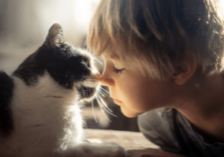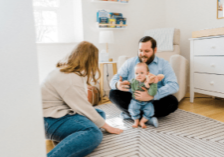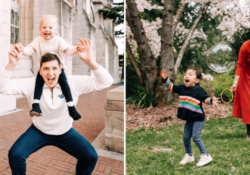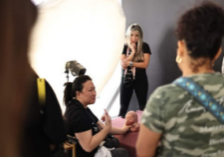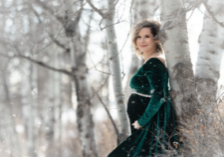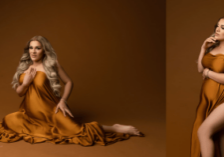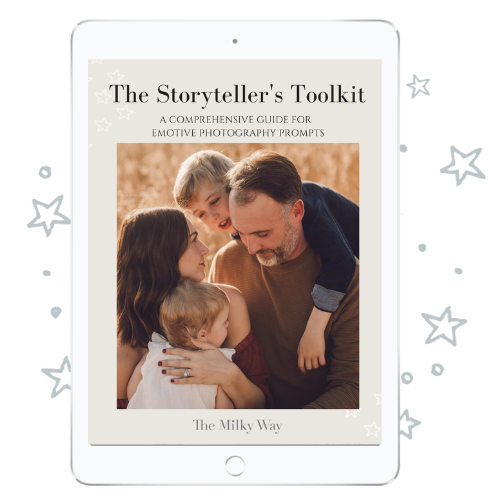Profit & Purpose: Planning For Success in Your Photography Business with The Motherhood Anthology
Money is a topic that so many creatives try to ignore. We want to focus on the art, we tell ourselves. But not knowing what your expenses are, not having a budget, and not being able to pay yourself are all big problems when it comes to owning a business. Your time is worth money.
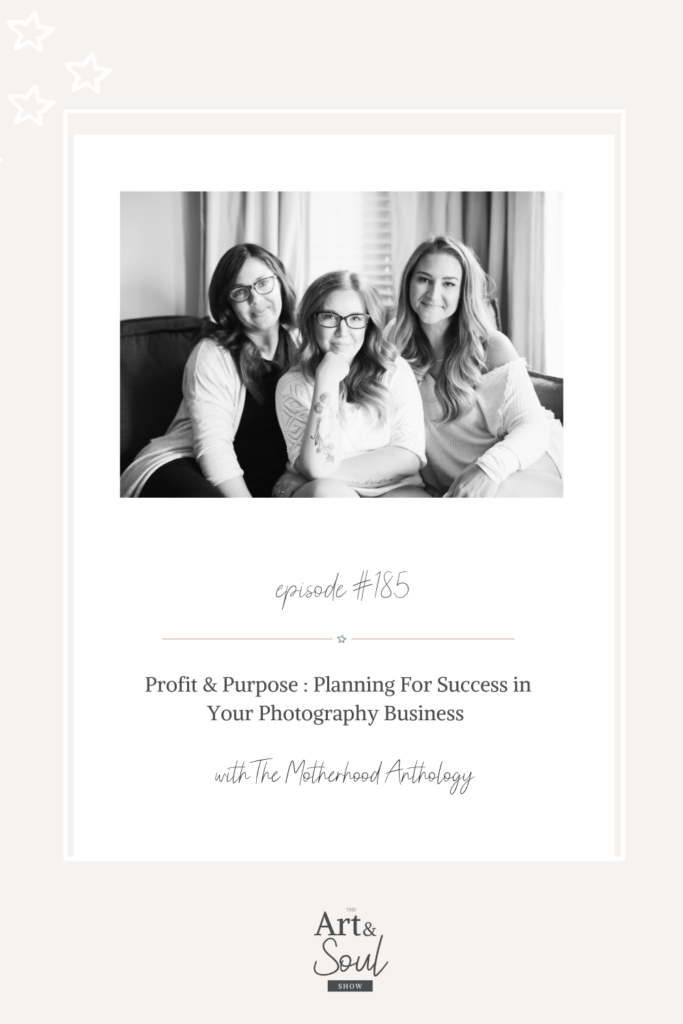
In today’s episode, I’m interviewing the ladies from The Motherhood Anthology (TMA): Jenny Cruger, Allison Craig, and Kim Box. They share why TMA came to be, why you should create a brand that aligns with you and your values, and most importantly, why it’s imperative that you run your numbers and know the costs of doing business.
In addition, each lady shares the best business advice they’ve ever received and it was so interesting to hear their unique perspectives.
What’s in this episode:
- [02:24] How The Motherhood Anthology came to be
- [08:14] How to create a business brand that aligns with who you are
- [11:54] Why it’s so imperative to know your costs of doing business and how to run your numbers
- [19:54] How to incorporate paying yourself into your budget and pricing, and how to change the mindset that clients won’t pay what you charge
- [27:55] The best business advice that Jenny, Allison, and Kim have received
Tune in to this episode for advice on why you need to know your numbers and the costs of doing business as a photographer.
FOLLOW: Apple Podcasts | Spotify
Want to put an end to awkward moments in your photo sessions and create genuine connection? Download The Storyteller’s Toolkit today, featuring 200+ emotive photography prompts, so you’re never left wondering what to say.
Meet the ladies from The Motherhood Anthology
Jenny Cruger, Allison Craig, and Kim Box are the creators of The Motherhood Anthology (TMA), an online educational platform for motherhood portrait artists. Together, the TMA team brings to the table decades of photography, experience, business ownership and entrepreneurial endeavors. TMA offers a free community filled with over 5,000 supportive, inclusive, warm, real and generous community members who believe not in the gatekeeping of best practices, but in the arm linking and collaboration of fellow artists.
Connect with The Motherhood Anthology
Visit The Motherhood Anthology Website
Listen to The Motherhood Anthology Podcast
Join The Motherhood Anthology Community on Facebook
Follow The Motherhood Anthology on Instagram
Did this episode inspire you to run your numbers and be able to pay yourself a salary in your photography business? Check out this episode Preparation is the Key to Success – With Mark Rossetto that offers you even more insight on finding alignment in your business!
Transcript
[00:00:00] Kim Box So many of the years that I was shooting. It’s just felt like a rat on a wheel, just like hustling because I was the breadwinner in my family. And so I just couldn’t stop. And that I think for a lot of us, it causes anxiety and burnout. And a guest on our podcast, she said, You know, we all need to know our enough number because when you know how much you have to have what’s enough, that gives you so much peace of mind.
[00:00:30] Lisa DiGeso Welcome to the Art and Soul Show, where we dive into heart opening chats on photography, business life and that messy in between. I’m your host, Lisa DiGeso, a mom, a photographer and entrepreneur, and I’ll be sharing honest conversations and advice for photographers with insight on mindset, entrepreneurship and creativity. The goal of this podcast is for you to be able to gain insights and strategies that will get you real results. Because let’s face it, having a photography business can be lonely, but it doesn’t have to be. This is the place you can go when you need a boost of encouragement, a kick in the pants and inspiration to pick up your camera. This is the Art and Soul Show. Hello, my beautiful friends. Welcome back to the show today. I’m super excited to dive into today’s conversation with Jenny Cruger, Allison Craig, Kim Box, the creators of the Motherhood Anthology. It’s an online educational platform for motherhood portrait artists. Together, the TMA team brings to the table decades of photography, experience, business ownership and entrepreneurial endeavors. TMA offers a free community filled with over 5000 supportive, inclusive, warm, real and generous community members who believe not in the gatekeeping of best practices, but in the arm linking and collaboration of fellow artists. Their Instagram and Facebook page boasts over 20,000 followers. Additionally, their podcast, titled The Motherhood Anthology Podcast, currently ranks in the top three of podcasts globally with a listen score of 34 and over 10,000 downloads in its short six months of life. I have been following these ladies for years and Jenny’s actually chat with us at the Milky Way before, so I am super excited to dive in today’s conversation with them. So without further ado, welcome, ladies.
[00:02:21] Jenny Cruger Thank you.
[00:02:22] Kim Box Thank you.
[00:02:23] Allison Craig Thank you.
[00:02:24] Lisa DiGeso So I would love to know how you all found each other and really how the Motherhood anthology came to be. And we’ll start with you, Kim.
[00:02:33] Kim Box Oh, well, I’ll say that Jenny’s the O.G. Is that what the young folks saying? She’s the founder. She’s the one that started it all. I think we were. Alison and I both were just big fans of Jenny and her work. And for me, Jenny was hosting a retreat at the beach and I’d been in photography for, Gosh, I’m the oldie here, but I’d been in photography for 15 years and wanted to meet Jenny. And so I came to the retreat and like I said, I’d been in photography for a while, and so I was kind of diversifying a little bit and was interested in this whole wave of memberships and courses. And Jenny and Alison at that point had a Facebook group online with lots of followers. And as we got to know each other, we just started talking about this idea of putting this community together and it’s been really great.
[00:03:26] Lisa DiGeso I love that. So, Jenny, I want to hear how did you come up with the idea for the Motherhood anthology?
[00:03:32] Jenny Cruger So I think for a while I’d been teaching for a bit, like you said, with The Milky Way, with Clickin Moms, on my own, all sorts of places. And I kind of like had this group of photographers that we were doing similar things and talking about similar things, and we just kind of formed that Facebook community that we still have today, that free community. And then Kim came on and we added the membership and whatnot. Allison likes to say that when she found me before that, she made me be her friend. I’ll let her tell that story, but she basically forced me to be her friend and it worked out okay.
[00:04:12] Lisa DiGeso I love that. I love it. So, Alison, that’s to you. I want to hear I want to hear how you got involved here.
[00:04:16] Allison Craig So I was at a point in my career where I really wanted to give an experience to my clients. And I remember I was Googling torn edge prints because I love the way that they looked. And I stumbled across an image that Jenny had posted. And so I reached out and I was like, Hey, would you tell me where you like what lab you ordered these from? And she was super kind. She wrote back and told me, and then I was like going through her website and saw that she offered mentoring. And so I wrote her back and like chastised her for giving away that information for free and was like, Why didn’t you charge me and tell me that you did mentor you? And so I drained my bank account then, because of course, I had not even know what the cost of doing business was. I was not profitable. It was horrible. I was a mess, but I knew I wanted to do better, so I drained my bank account. I think at that point, Jenny, you were like doing an online magazine or like an online PDF booklet maybe?
[00:05:13] Jenny Cruger I think so. I think it was like an online book of like, just everything that I knew and did. And then a private group.
[00:05:20] Allison Craig Yes. So I literally consumed that entire thing in one night and changed immediately. And Jenny and I are complete opposites, so it’s a good balance. And yes, I did make her be my friend.
[00:05:35] Lisa DiGeso So I love that so much. And so we’re recording actually, we’re recording from all different locations. So you’ve created this enterprise in this business from all different areas. So where are you all located and do you get together very often?
[00:05:49] Allison Craig So my studio is in Houston, Texas, by live in Asheville, North Carolina. So I a year and a half ago moved my family to Asheville and then I commute monthly. And yes, actually, mine and Jerry’s kids are best friends. And so we’re getting together next month because our kids are forcing us to.
[00:06:10] Jenny Cruger If we go more than like six months without the kids seeing each other, we like have to. So.
[00:06:16] Allison Craig We do get together, we try to get together, the three of us, for the TMA team to kind of like do planning. And it’s been hard the past couple years, obviously, but.
[00:06:24] Lisa DiGeso Absolutely.
[00:06:25] Allison Craig We definitely like try to all meet up and do some planning and do some stuff and whatnot.
[00:06:31] Jenny Cruger We need that right now.
[00:06:32] Allison Craig We do. We really do.
[00:06:34] Lisa DiGeso It’s true. Well, I don’t know. I’m sure I’ve said this on the podcast before, but with the Milky Way, I have a business partner, Erin, and we’ve been together for, oh gosh, 13 years, like and it’s just incredible. Like when you have a running mate in your business, it is so much easier not only to like get things done, but to stay accountable. Like when you are a solopreneur, as you know, like in probably in all of your photography businesses, you’re like, I get this done a lot quicker than I do because everyone’s waiting for me and I don’t want to be the bottleneck.
[00:07:06] Allison Craig Right. Exactly.
[00:07:08] Kim Box And I think for the three of us, I think we we all bring something kind of different to the table. And that makes for a good partnership, too.
[00:07:15] Lisa DiGeso Absolutely. I love that. So I would love to hear about the strengths and what you do bring to each other.
[00:07:21] Kim Box Like you said, I’m more behind the scenes like I am in our community and not as active. I also own indie print co, an indie film lab with a different business partner, and so I still occasionally shoot, but not as much anymore. And so I’m more behind the scenes with the podcast and like I said, the membership, the back end of the membership. But Jenny and Allison are so, so, so involved daily in our community. That’s kind of my piece of the pie.
[00:07:51] Jenny Cruger We like to say that Kim is like the thinker upper so Kim will be like, Hey, what about this idea? What about this idea? And Allison and I will either yay or nay. And then like, you get into motion. So Allison and I, I think we’re similar in that when we have an idea and we know that we want to do it, it gets done like yesterday.
[00:08:08] Allison Craig Yesterday? Yeah. Yeah, I know.
[00:08:11] Lisa DiGeso She’s like, she, like, takes it and runs with it like she’s, she’s the implementer. So let’s talk. I want to dive into a conversation about brand as a business and how to really create a business brand that aligns with who you are, because I think so many of us just get stuck in our branding and how we set it up at the beginning, and we may not be in love with it still. So what’s your advice on that?
[00:08:37] Jenny Cruger Yeah. I think when you first. At least in my experience, when you first starting out with your photography business, you see all these other things that people are doing. You’re like that successful, that successful, and you like pull from that, but you never take the time to really dig in deep to like what is authentic to you and like what you want to represent and what’s different. And I think that step is missed so much. And when you can either go back and do it or do it from the beginning, you set your business up to be like just different enough from everybody else’s. Yeah.
[00:09:10] Lisa DiGeso Yeah. I think a lot of the time that people really struggle with keeping it cohesive where it’s like the same font or like the same colors. So what advice do you have when they are just kind of grabbing everything and how to just keep things on brand?
[00:09:25] Allison Craig We will take people through like exercises where if you just look at grab a few pictures that they’ve taken that they absolutely love and figure out like what you love about that. And so that might be certain colors that like happen to be in the same pictures from same sessions. Maybe that’s like authentic to you and like what you really like. But so often, whether it’s colors or fonts or it’s products that you’re offering, people try to just offer everything or show everything. And clients really don’t realize that that might be like what’s deterring them or what makes them love a photographer. But it is. And so if you can really just simplify and focus on like 2 to 3 colors and one or two fonts, it’s going to make your brand so much more impactful. And the clients, they might not even realize that, like, that’s why they love you, but they’re going to love you more because it’s not overwhelming to them.
[00:10:32] Lisa DiGeso Totally. You know what it kind of reminds me of is like, I love shopping. Like I love shopping, but I also love the idea of a capsule wardrobe, because when you have too many, what happens is I have this closet full of these amazing clothes that I love, but yet I will wear yoga pants every day because I get so confused and overwhelmed with what to put on. So I think it’s like creating a capsule wardrobe for your business brand of like, these are the things that go together and these are the things that I only use.
[00:11:04] Jenny Cruger And consistently like using them over and over again because like it’s yeah, it’s the same thing. I love shopping too, and I will continually buy like the same things over and over again. I’m like, Well, I need it from this brand and I need it from this brand. And like, I don’t have enough like black linen pants for the summer and more pairs, but you’re still buying the same thing because like, that is what you love and what you like. And so knowing those things for your business and continuing to repeat them over and over again really builds that brand recognition for your clients.
[00:11:36] Lisa DiGeso Totally. Are you like me? And will get like the same thing and like, all the colors.
[00:11:39] Jenny Cruger Only black and white and brown. I will buy like 20 different white shirts that are about the same. Yeah, but they’re all the same.
[00:11:54] Lisa DiGeso I love that. So let’s talk a little bit about money. And I know this is a point where many of us really want to dive your head into the sand. So can you share why it’s so imperative to know your cost of doing business?
[00:12:04] Allison Craig Oh, man, this is like what me and Jenny preach about in the group. We talk constantly about cost of doing business and how if you do not know your numbers, like whether you’ve been in business for a year or for ten years, you have to have an idea of that. Otherwise you could just be operating in the red and be oblivious to it. So any time that someone joins our group and asks What’s the first thing we do, we always say, Have you run your numbers? Because you have to know.
[00:12:36] Lisa DiGeso Yeah. And so I’m going to dig a little bit deeper because a lot of listeners and a lot of new beginning photographers don’t even know what running your numbers mean. So can you dig a little deeper on what to include in running your numbers?
[00:12:50] Allison Craig Yes. So we have a worksheet that we’ve created, but really, you can Google like a cost of doing business worksheet, and it’s just going to take into account your expenses, which you need to include every single expense and really overestimate. And we always tell people, while you can think in the now, you really should think like three years ahead so that you’re not having to constantly just raise your prices again and again. So include your expenses and you’re going to include a salary for yourself so you could actually pay yourself and then you’re going to factor in from that. Like, do you want to include a session fee? You’re going to include how many sessions you want to shoot a year, and then it’s going to sort of work backwards and tell you what you need to charge per session in order to be profitable. So bottom line is you need to factor in all of your working expenses and how much you want to work and that you actually need to pay yourself, because I did not pay myself for a very long time and there’s no point in working if you’re not making money. You wouldn’t do that any other job. So you shouldn’t do it if you’re self-employed.
[00:14:02] Lisa DiGeso No. And I think learning how to stick to a budget is such like a hard lesson. Like I really had to learn that one the hard way and not just spending everything on the client closet because I wanted to.
[00:14:14] Jenny Cruger That there’s so many shiny things that we can buy. Yes, that’s me. But thankfully I still included all in my cost of doing business. But it’s not cheap. But there’s so many things you can buy, and every time you buy something, you really have to ask yourself like, is this thing going to make me more money? Is my business going to go further because of it and benefit our clients? Going to even notice if I do this? I mean, really take into account those expenses. And if you’re already like super low price, try to cut some of those expenses. You know, there’s only a few ways that you can make more money and that’s, you know, lower your costs and expenses, raise your rates or work more. And there’s only so much work we can do or should have to do. Yeah, you shouldn’t have to do even five, six, ten sessions a week to make a reasonable salary at all.
[00:15:03] Lisa DiGeso No. No. It’s really hard it’s hard to watch a lot in the communities too, because you see all these new photographers coming in. And of course, there’s so many mixed messages in the industry of like, well, you’re not ready to charge yet, so don’t take anybody’s money. But you can’t you have to charge something because you’re undercutting the industry. So they get so confused about what to even do. Gosh, like to be like someone who is just starting out. It’s hard. It’s hard for them because you’re like, What do you do? Yeah, but beyond crunching your numbers and when we first started, there really wasn’t a whole lot of information beyond, I think, like, easy as pie. You remember that?
[00:15:41] Jenny Cruger I remember that. Yeah, that’s right. Yeah.
[00:15:44] Lisa DiGeso The idea as pie. And then that was setting us up for in-person sales. And not everybody wants to do in-person sales because there’s so many different ways to run a business. Right?
[00:15:52] Jenny Cruger Exactly.
[00:15:53] Lisa DiGeso I just think it’s so fascinating. And even like, when you see in groups, there’s so much hive mind, like they’re trying to outsource their thinking and say, okay, well, what do you guys think I should charge for additional files? Right? And you’re like, Well, you’ve got to crunch your numbers.
[00:16:13] Jenny Cruger Right? Like, well it doesn’t really matter to you. It’s funny because, like, no other industry would have groups of people going like, Hey, what should I charge for this? Like, no other business starts out having no idea that they’re supposed to use those expenses and their costs and whatnot and like what they need to make and and taxes to the county for paying like 20 to 30% of your gross revenue just right off the bat in taxes. Every other business that anyone would start automatically like starts in that area and knows to include those things. But sadly so many photographers don’t. And it’s sad to see.
[00:16:52] Lisa DiGeso It is sad to see. So I love I love what you guys are doing and just really teaching everyone how to run their numbers, run their cost of business and figure things out. Because when you actually sit down and crunch your numbers, how heartbreaking it is that you’ve missed soccer games or birthday parties because you’re out shooting a session for nothing. Yeah, and it hurts. It hurts looking back because we only have so many so many years with our littles, right. And you don’t want to do it for free.
[00:17:19] Kim Box So many of the years that I was shooting, I just felt like a rat on a wheel, just like hustling because I was the breadwinner in my family. And so I just couldn’t stop. And that, I think, for a lot of us causes anxiety and burnout. And I had a guest on our podcast a few weeks ago, Shawna Skidmore. I’m not sure if you know Shanna, but.
[00:17:41] Lisa DiGeso No, I don’t.
[00:17:43] Kim Box She’s a finance girl. And she she said, you know, we all need to know our enough number because when you know how much you have to have what’s enough, that gives you so much peace of mind to rest or to take a break. But if you don’t know your number, then you just have to keep going. So I thought that was really good advice.
[00:18:04] Lisa DiGeso That’s that’s really good advice. For me, I think my breaking point was probably 2019 and I had scheduled and booked 87 holiday mini sessions over a four week period and I was charging roughly around 500 per session. So, I mean, it sounds like it was profitable, right? This girl spent so much money on props, on set, on backdrops that when I crunched my numbers, I came out with $5,000 and I was like, I worked that hard for five grand. And I actually found this out. I did my numbers on Christmas Eve day, and I was just like, so sad. Broken. But I was also is the biggest gift because not only do I remember that is that I was like, I’m never doing this again. And this is only like four years ago that I had to learn this the hard way. And I was like, I’m never doing that to myself. But sometimes that’s how you have to learn. The lesson is it has to get that painful for you to, like, make a change, Right? Right. So my poor depressing story.
[00:19:14] Kim Box We all have that story.
[00:19:16] Jenny Cruger We totally see that a lot or like somebody’s partner will just be like, fed up, that their wife is working all the time. And not that, you know, as a wife, you shouldn’t be working out. Like if you’re going to be working and you’re going to be working hard and you’re going to be working a lot, you should be making a lot of money. And so, yeah, I can understand whether it’s a husband or wife. If you’re gone all the time, working all the time and you’re not bringing home a decent salary like any partner’s going to be like, what are you doing? That’s awful. Yeah.
[00:19:49] Lisa DiGeso Like, my husband was not happy. Exactly. Oh dear. So I think and we touched on this a little bit earlier, and it’s about paying ourselves like that is the missing ingredient that so many of us have forgotten to do. And we don’t even realize that we should be paying ourself a living wage. So what advice do you have about budgeting that into your pricing and working that into your pricing? So it’s something that you’re doing immediately?
[00:20:16] Jenny Cruger I think just when you’re doing that cost of doing business, it’s so easy to say that, okay, all of my expenses are paid for, so like I’m not in the red, so technically my business is profitable. But if you’re not planning at least to give yourself a salary that you could wherever you live, live off of. And we were looking at something about low income housing a few weeks ago and what salary qualifies based on where you are in your area, what salary you would have that qualifies you for low income housing like government assistant housing. And some of them are like 30,000, 40,000 to $50,000 a year. And so I think we aren’t being 100% honest with ourselves even to say that, okay, I want my business to be profitable. I put in a $40,000 salary for myself. Like that sounds not terrible, right? Like after your expenses and whatnot. But turn around and say like, can you pay your mortgage? Can you buy the things you need? Can you buy groceries? Can you live more than just like paycheck to paycheck and actually, like, have a restful life where you feel secure on $40,000? Like probably not any more today in most places. And so just. I mean, like, I don’t know how you could do it. I’m not saying you have to put it in a salary to make a half a million dollars a year, but you have to be reasonable with yourself and really say that if you are going to work full time and spend all these hours in your business, you deserve to be paid like that. Like Allison said, you wouldn’t go to any other job and work for not a reasonable salary. No. And especially if you don’t if you’re in a position where you don’t even have to make a salary, a lot of people will say, Well, then my partner makes enough to pay all of our bills and I don’t really need to. But then like, especially then, you should even make it higher because like, you don’t need to work. And so for me, like if I didn’t need my income, I’m certainly not leaving the house. We call it like putting your pants on, putting your bra on minimum, like I’m not going to leave my kids and my dogs and my horse when I could be doing fun stuff with them for not a good amount of money. So even if you don’t need the money to pay your bills, don’t work for less than what you should need to pay your bills.
[00:22:42] Lisa DiGeso Yeah. Then I think what often happens to photographers is that they run into this. Either it’s a mindset block or it’s a belief that their clients will not pay them what they need to charge. And so how do you get around that with your students to show them that your clients will pay this? Or you need to find new clients and you will find new clients? How do you get around that?
[00:23:04] Kim Box Another guest from the podcast spoke to this and I thought it was so great. She said, Really are people able to shift their mindset on their own? And I think that’s what’s so great about The Motherhood Anthology community, is that you kind of watch this pattern of people that are just starting out or that just join the group and they see the people that are successful, that are charging a sustainable price and they’re like, I could never charge that. And before long, they get enough information encouraged to to implement some of the things in the group that they’ve learned. And then they share that post like, oh, my gosh, you know, my largest sale to date. And it’s just fun to see the mindset shift and it comes from surrounding yourself, from other people that are that are doing it, you know, that are successful.
[00:23:52] Lisa DiGeso Yeah, it’s like it’s like that proof of possibility and what I like. It was so funny because I actually had this mindset too. I was like, okay, well, you know what? There is not another photographer in my city. It’s a small city of maybe 80,000 people. Not another one charges more than 1500 dollars for a photography session, not a single one. And I was like, I don’t think I can charge that. And then I found a boudoir photographer who is packed. Packed! Roslyn is amazing. She’s her schedule’s loaded and she’s making mint charging like 3 to $5000 per session in my little city. So it’s almost like you need to search out that proof of possibility of someone that is actually doing it in your own city to know that it can happen for you, too, and that those clients are there, right?
[00:24:41] Kim Box Yeah. And that same episode, she said, you know, we we all forget that most people are carrying around $1,000 phone in their pocket at all times.
[00:24:49] Lisa DiGeso Right.
[00:24:50] Kim Box People will find the money or people will save the money for something they really want.
[00:24:56] Lisa DiGeso Yes.
[00:24:56] Kim Box So we just have to be able to deliver an experience and a product that they really want.
[00:25:03] Lisa DiGeso Yeah, yeah, yeah.
[00:25:04] Jenny Cruger And I think we tell ourselves so many things that just aren’t true. Like you were saying in your city, I was in a not at one of our groups, but a different group. Somebody was really like going back and forth with me about how like what I do is great and all that’s nice and blah, blah, blah. But like, she could never charge that where she lives. Like, never. Like I’m like, going on and on about how like, I’m insane to imply that that’s even a possibility. And finally I was like, okay, well, let me just see where you live. Like, let me click on your profile. Like dig a little deeper. She lived 20 minutes away from me, literally 20 minutes from my front door to hers. Now I live in a town maybe 30 minutes south of Nashville, So, like, it’s not in the city, but like I market to Nashville. So I knew that, like, she lived 20 minutes away from that, which again, is not in actually Nashville, but like you would market to Nashville. And I was like, you live 20 minutes away from me if I can charge what I’m charging. There may be other reasons you can’t do that or don’t want to, but like, it’s not a location issue and that is rarely the issue now.
[00:26:15] Kim Box I love what you say about you’d rather compete with the one or two other people in in your price bracket than the hundreds in the middle.
[00:26:23] Jenny Cruger Right. Like, I want to be the highest. If I’m not one of those highest, I’m not happy. It’s so much less competition and it’s too low. Those middle people are just. You’re competing on price. Yeah. And that’s really hard. It’s so much easier when you’re in a higher price range completely.
[00:26:41] Lisa DiGeso You know what’s funny is that what happened to me is because I put my blinders on for years and I’d always been like, I’m the highest, I’m the most expensive, I’m the most expensive, I’m the best and the most expensive. Just total, like, sassy little ego, right? And then one day I looked at it was like, Oh, actually, it’s been a while. Like, I wonder what everyone else charges in my city. Like, maybe I should have a look, right? I wasn’t the most expensive. I wasn’t at all by a long shot. I was like, Lisa. Raise your prices, girl. What is going on here? Like, you talk about this, but you need to do this, right?
[00:27:20] Kim Box I heard someone say one time that you want to be the photographer that people want to save for. Like they. You want them to say, when I have a baby, one day I’m going to use Kim Box photography. Or when I get married one day. Like you want to be that one that’s so special that if they have to save, they’ll save for you.
[00:27:41] Lisa DiGeso Yeah.
[00:27:42] Kim Box That’s the consumer that I am. Like, I don’t buy everything but the things that I love, I really love. And I will save for what I really want, you know?
[00:27:52] Lisa DiGeso Yeah, exactly. I love that. All right. So I’m going to switch gears a little bit, and I want to know what is the best piece of business advice you’ve ever been given. And we’re going to start with Allison.
[00:28:06] Allison Craig To raise my prices. I mean. I was I mean, really, I started lower than this. But when I started really booking a lot of people, I was right at 350 for a session with all digital files. And that’s when I knew I was burnt out. I knew that I wanted to give like more of an experience and that I wanted to do better. And so I had the same money blocks as everybody else. I had no idea like where to even start, but I knew I wanted to do something different. And so the best advice was what I learned from Jenny. And I took it and ran with it and went from, you know, 350 to I raised my prices about like my first actual sale was like 1800 dollars overnight. And I almost choked whenever that happened and didn’t look back. And now whenever I raise my prices back a little bit to what we were talking about, I raise them with the intentions of if something happened tomorrow. And I was like the only person working. Could I sustain my family? Yeah. And like, Jenny broke her leg. You know, she had to be out for a while. Can her business float that? Last May, my husband decided to quit his job. And so I am the breadwinner now. And because I approached that not with the mindset of I don’t deserve a salary, but with the mindset of I deserve a salary. It was no big deal. You know, we could afford to lose that good salary and just survive on this. So. That was probably the best advice ever given, was do your cost of doing business and actually listen to the numbers, because the numbers do not lie.
[00:29:57] Lisa DiGeso Yeah, that’s good advice. Jenny, how about you?
[00:30:01] Jenny Cruger This was hard. I was actually thinking about this all night last night. I think my dad was my biggest supporter when I first started my business, and he passed away seven years ago, but he owned a small business like when I was little. So around the ages that my kids were when we lost him. He had me about that age when he had a small business and he said, You know, I wish I had the strength and just like confidence to not let clients push me around and not let them ask for discounts and feel guilty for charging people money, for doing a service or product, whatever it was, he was like. I’m just so proud that you were like, charging like what you’re charging and like your clients pay it like. He was shocked that my clients were paying me what they did, but that allowed me to then, you know, give my parents money and help them out. And now that he’s gone, like my mom lives with us and we pay for that. And so I’m just thankful that he, like, supported me and like, encouraged me to not let clients really push you around and feel bad for taking their money.
[00:31:08] Lisa DiGeso Yeah. And I’m sorry for your loss.
[00:31:12] Jenny Cruger Thanks.
[00:31:14] Lisa DiGeso Kim, how about you?
[00:31:15] Kim Box I said, I think the best advice that I was ever given probably was from my dad. He told me one time that I was working too much. My prices weren’t high enough. I think I was complaining about being tired or working all the time. And he’s like, If you’re working more than you want to work, your prices aren’t high enough. And that always stuck with me that.
[00:31:34] Lisa DiGeso Hmm.
[00:31:35] Kim Box But I think the the piece of advice that if I’ve had any success, I think it goes back to when I was a kid that it was for my mom. I showed horses as a kid and she would always make me go to the judge after an event and ask, how could I be better? And that has always kind of followed me in my life, like if I want to do something. Not so much that I copy someone, but I look for who’s doing what I want to do or who’s doing something really well. And then I just try to either talk to them, ask questions, figure it out, you know, like ask them. Yeah. And I think that’s why I love the podcast so much, because it’s my excuse to get to pick people’s brain.
[00:32:16] Lisa DiGeso Right?
[00:32:17] Kim Box People that used to be that you could say, Hey, would you have coffee with me for an hour and let me pick your brain? And people are too busy for that now. And so but if you ask them, Hey, would you hop on the podcast with me and let me talk to you for a while? Sure. You know, people want to be on podcast. And so I think just find someone that’s doing what you want to do and talk to them.
[00:32:40] Lisa DiGeso I love that. That’s great advice. All right, we’re ready for the Lightning Round. Okay. We’re going to go Allison, Kim, and then Jenny, I’m going to have you all respond. Okay? Coffee or tea?
[00:32:54] Allison Craig Coffee.
[00:32:55] Kim Box Coffee. All day. Every day.
[00:32:59] Jenny Cruger Equal.
[00:33:02] Lisa DiGeso Love it. The most luxurious vacation you’ve ever been on.
[00:33:08] Kim Box I had a hard time with this one, like, and I’m like.
[00:33:12] Allison Craig Probably. I mean, probably Saint Lucia. I don’t know.
[00:33:16] Kim Box Jackson Hole is probably the best vacation.
[00:33:19] Jenny Cruger I want to go there. We’re creatures of habit. We go to Rosemary Beach every year, and like that is we make it a luxury.
[00:33:28] Lisa DiGeso We love that. Favorite TV show as a kid.
[00:33:31] Allison Craig You know, the first thing that popped into my head was Full House. So I’m going to go with that.
[00:33:36] Kim Box I’m going to have to preface this and say I’m not this old. Okay, well, this is my still my favorite TV show, and I bet you guys have never heard of it, but it’s The Waltons. Have you ever heard of The Waltons?
[00:33:49] Allison Craig Yes. Yes, I remember that.
[00:33:55] Kim Box OK Jenny, you just go watch it. It makes you feel good about life. That you can disconnect from the world. And all is well. And it’s just my peaceful I need a brain break show.
[00:34:06] Lisa DiGeso Is it like Little House on the Prairie?
[00:34:09] Kim Box Sort of. Same area.
[00:34:09] Lisa DiGeso Oh, I’d like that. Oh, I like that.
[00:34:12] Jenny Cruger Oh, my. Gosh. I’m going to go friends.
[00:34:15] Lisa DiGeso Good one. Morning person or night owl.
[00:34:18] Allison Craig Morning person.
[00:34:20] Jenny Cruger Neither. I need like a solid 12 hours sleep. Don’t wake me up too early and, like, don’t keep me up too late.
[00:34:30] Lisa DiGeso Go to karaoke jam.
[00:34:32] Kim Box You’re not going to catch me and Jenny doing karaoke. I would never.
[00:34:35] Jenny Cruger No, I’m the extroverted one. And I would never, ever do karaoke. I love it. Absolutely not. But if I did, if I did, it would probably be Britney Spears.
[00:34:46] Lisa DiGeso Love it. Okay. Song you sing in the shower or your car by yourself.
[00:34:52] Kim Box I don’t listen to music in the car. The only place that it’s quiet and no one talks to me. It’s the only silence I ever get.
[00:35:02] Allison Craig Oh, my gosh. I well, everyone knows that I listen to a lot of music with a lot of bass, so you don’t want to know what I listen to in the car. It just has a lot of four letter words.
[00:35:15] Lisa DiGeso Oh, wow. So good. Let’s see. What did you want to be when you grew up?
[00:35:22] Allison Craig I was a labor and delivery nurse. Yeah.
[00:35:25] Kim Box Chef.
[00:35:26] Jenny Cruger And so from the time I was 12, I wanted to be in the music industry on the business end. So I thought I would own a record label or be like an entertainment lawyer or something like that.
[00:35:38] Lisa DiGeso I love that. You know, it’s so funny is my mom called me that I was having conversations. She’s like, Do you remember like when you were five, what you used to tell me you wanted to be when you grew up? I was like, No. She’s like, You were insistent that you were going to be a harp player. But so funny. I just wanted to play the harp.
[00:35:57] Jenny Cruger Do you know how to play the harp?
[00:35:58] Lisa DiGeso No! Now I was, like, insistent about it. Like I wanted a heart so bad after one for Christmas. And I was like, Really? Like, no memory of this Mom, like hilarious. What’s for dinner tonight?
[00:36:18] Kim Box So fun thing. I’m going to a party. My friend is a food blogger and he is on Guy’s grocery games tonight. His name’s Stacey. Little Sudden Bite. So he has a watch party tonight, so I’m going to his watch party. Not sure.
[00:36:32] Lisa DiGeso Yeah.
[00:36:34] Allison Craig I don’t know what’s for dinner tonight. Where I’m going to go up to the pool after this. So probably like cheeseburgers or something really easy, and we don’t have to think about it.
[00:36:42] Lisa DiGeso I love it. Jenny, how about you?
[00:36:45] Jenny Cruger I don’t know either. That’s our that’s our 430 decision. Whatever Right. Decides to make or order order in.
[00:36:52] Lisa DiGeso I know. I was just looking for ideas.
[00:36:54] Jenny Cruger Yeah. Same. Same. I don’t know.
[00:36:58] Lisa DiGeso Take note. Okay. What makes your soul light up?
[00:37:04] Kim Box That’s a good question.
[00:37:05] Allison Craig My kids, my family, gardening, travel outdoors. Yeah.
[00:37:13] Kim Box Definitely my kids. I feel like that’s a given, though. These days we have a new lake cabin, and so that’s just my happy place. So peaceful. And there’s something about just sitting in near the water and that brings a lot of peace. So I think the lake these days.
[00:37:30] Jenny Cruger You love that. Oh, so I was going to go business wise like moms and babies like that connection for me. Obviously, kids and animals love that.
[00:37:42] Lisa DiGeso So where can our listeners learn more from you ladies?
[00:37:45] Kim Box Definitely the Motherhood Anthology on Facebook, we have a free group. Besides our membership, our podcast, The Motherhood Anthology podcast. They can find me. I just recently created a kimBox.com, which kind of points to print co and film Lab and Motherhood anthology in the podcasts and all those things.
[00:38:04] Jenny Cruger So yeah, the Motherhood anthology dot com will lead you to everything. And jennycrugerphotography.com for me.
[00:38:12] Allison Craig Yeah, lentillephotography.com/ for me and the Motherhood anthology, of course.
[00:38:17] Lisa DiGeso Love it. So I’d love to end the interviews just with this last question. And it is what are you currently curious about or artistically curious about? And Jenny, we’ll start with you.
[00:38:27] Jenny Cruger Oh, okay. That’s so hard. Okay. So this is going to be so, so random. But we have a horse and my kids have a show coming out next month. And so I don’t know if anybody knows anything about horses, but like their bridles that they wear when you ride, they have this brow band that goes across their forehead and usually like ours, are just plain leather. Well, last week I got it in my head that I wanted to get like a sparkly one, like they make one like gemstones and things like that. So I’m scouring the Internet for, like, the exact one I want because I’m a good shopper, but I’m, like, really picky. So I looked at everything from like $50 to like $500 for this piece of leather with gems on it. Nothing I loved. So then we spent hours and the kids and I figuring out how to just make it ourselves. And probably 10 hours of my weekend last weekend was making this brow band like hand sewing these gems on. And it was it was a project, but it was so creative and it was so fun and so different than like what I normally do in. But that took all of my time. It was fun, though.
[00:39:38] Lisa DiGeso So fun. I love that. I love crafting. Kim, how about you?
[00:39:42] Kim Box So I’ll say two things. One, the podcast, like podcasting, is a whole new thing. It’s a whole new world has been so much fun, but it’s definitely been there’s been a bit of a learning curve, so that’s actually been fun to do something different. You know, it’s been photography for so long and then I’ll say a little bit of a confession. So I’ve been the co-owner of Indie Film Lab for ten years and I haven’t shot a lot of film. You know, I shoot children and they move fast and I was kind of set in my ways, and so I never really made the swing. And so now that I don’t have to shoot so much for my profession, I’m having a lot of fun with film personally. And so that’s something that I’m a little it’s always been there, but that I’m enjoying more and more.
[00:40:30] Lisa DiGeso I love that. Allison, How about you? What are you currently curious about, artistically curious about?
[00:40:35] Allison Craig So not so much artistically, but moving to North Carolina from Houston. It is totally different here and you can actually grow things and not everything dies. So I started a garden and a vegetable garden this year that sort of got, well, no pun intended but squashed. The tree fell on it, so. And almost on me so herself. Yes. So I feel like that sort of stopped. But I started cut flowers last year whenever I first moved to North Carolina. And those have like really taken off and they’re just starting to bloom again. So really just being able to honestly put a boundary on my work. And when I’m here in North Carolina, obviously I still work every day with TMA and my business, but putting boundaries on those hours and then being able to get outside and do flowers and be in the garden and just play remove myself from photography has been really nice. So growing new things this year and it’s been fun.
[00:41:40] Lisa DiGeso I love that. Yeah. Well, ladies, thank you so much for joining me today.
[00:41:45] Jenny Cruger Thank you for having us. So good to see you again.
[00:41:49] Lisa DiGeso Thank you. Oh, my beautiful friends, I hope you have loved this conversation just as much as I have. I am sending you so much of my light and my love today and every single day. We will see you next time. Hey, friend, you know what’s the worst? It’s just being mid-session and completely freezing. You start to feel awkward. Your clients start looking at you for direction, and your brain feels like you just hit a wall. Now, believe me, you are not alone. And that’s why we created the Storytellers Toolkit. It’s an emotive prompt guide to help sessions stay free flowing and fun and best of all right now it’s totally free. It’s full of prompts for parents, motherhood, family, siblings and couples, and even surefire smile prompt. And we put together over 200 prompts for you so you’ll never be at a loss for an idea again, grab your copy at themilkyway.ca/toolkit.
share the love
[Sassy_Social_Share]
recent
Podcasts
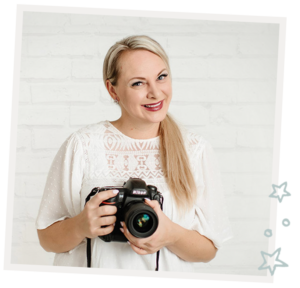
I'm
Lisa DiGeso
I’m on a mission to create uplifting online experiences for photographers ready to elevate their art, their business and their mindset.(...and have fun along the way!)

